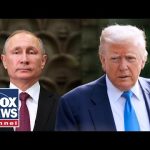President Trump walked into the ASEAN summit in Kuala Lumpur and walked out having done what weak-kneed diplomats only talk about: he brokered a serious ceasefire between Thailand and Cambodia that halts the bloodshed and forces both governments to the table. This wasn’t window dressing — leaders signed an expanded ceasefire with commitments to withdraw heavy weapons and release prisoners, and American diplomacy was front and center. The rapid, tangible result flips the narrative that the United States is in retreat in Southeast Asia and hands Beijing a political embarrassment it didn’t deserve.
The ceasefire package includes practical steps — heavy artillery pulls, prisoner releases, mine clearance cooperation and an ASEAN monitoring mechanism — that turn a headline into a sustainable de-escalation rather than another temporary lull. Mr. Trump’s presence at the signing underscored that when America leads, fragile neighbors choose peace over chaos. For hardworking Americans watching our taxpayer dollars finally produce security and stability rather than endless, fruitless handwringing, this is the kind of results-driven foreign policy they voted for.
At the same time Trump cut a deal with Malaysia that undercuts Beijing’s chokehold on critical minerals — Kuala Lumpur agreed not to impose bans or quotas on exports of rare earths to the United States, opening a vital supply lane for our manufacturers and defense industrial base. This isn’t charity; it’s smart, muscular economic statecraft that protects American jobs and national security. The move forces China to compete on the merits instead of manipulating supply chains to wield geopolitical power.
Don’t be fooled: rare earths are as strategically important as oil was in the last century, and for years Democrats and globalist technocrats let China monopolize the processing and refining that powers everything from smartphones to missiles. By locking in access to Malaysian sources and signing reciprocal trade measures, the administration has denied Beijing a key lever of coercion and strengthened U.S. resilience. This is the kind of America First economic policy that translates into manufacturing jobs, stronger defense readiness, and a safer future for our children.
The deals on the table are not small — commercial packages tied to preferential market access, aircraft procurements and semiconductor and energy arrangements are estimated in the tens of billions and signal a bigger reorientation of commerce toward allies. U.S. companies and workers stand to win as supply chains diversify away from China and into friendlier jurisdictions that respect contracts and national security concerns. That kind of pragmatic, deal-making diplomacy is the opposite of hollow summits and virtue-signaling; it puts American prosperity back at the center of foreign policy.
The predictable chorus of critics in the Washington swamp will squawk about negotiations and nuance while missing the point: strength and results matter more than performative moralizing. Conservatives should celebrate that a bold president is converting leverage into real-world gains — peace on a volatile border and reliable access to critical minerals — rather than ceding influence to Beijing. If you care about American security, jobs, and standing in the world, this is the direction we should double down on.



